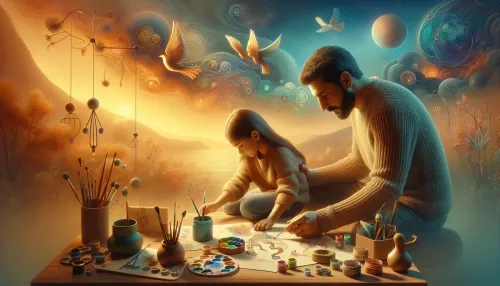Crafting Futures: The Therapeutic Touch of Clay in Autistic Development

Art therapy has gathered significant attention for its positive influence on children with autism. In recent years, pottery, in particular, has emerged as a remarkably effective medium for nurturing autistic development. The tactile nature of clay, combined with the process of molding and shaping, offers a unique sensory experience that transcends traditional therapeutic approaches. In this article, we delve into the profound impact of pottery on autistic children's neurodevelopment, motor skills, emotional well-being, and community integration.
The Impact of Art Therapy on Autism Development
The act of working with clay engages multiple sensory modalities, making it an ideal tool for stimulating neurodevelopment in autistic children. Studies have shown that sensory integration plays a crucial role in cognitive development and emotional regulation among individuals on the autism spectrum. Pottery offers a multisensory experience, encompassing touch, sight, and proprioception, providing a platform for sensory exploration and integration.
Molding Minds: The Science Behind Pottery and Neurodevelopment
Dr. Emily Carter, a renowned developmental psychologist specializing in autism intervention, emphasizes the significance of sensory-rich activities for autistic children. "Engaging in activities like pottery allows autistic individuals to develop their sensory processing abilities," says Dr. Carter. "The tactile feedback from manipulating clay aids in refining fine motor skills while promoting emotional expression through physical interaction with the medium."
How sensory integration aids cognitive development
The process of pottery-making inherently encourages the refinement of fine and gross motor skills essential for daily living. Autistic children often face challenges related to motor coordination and dexterity. Engaging in pottery provides them with a purposeful activity that naturally hones these skills. From wedging the clay to shaping it on the wheel or hand-building forms, each step requires different levels of motor control, offering progressive challenges that contribute to skill enhancement.
Furthermore, the repetitive nature of pottery tasks, such as wedging and centering clay on the wheel or refining hand-built forms, supports the development of coordination and focus. This iterative practice fosters perseverance and attention to detail, vital traits in both personal growth and academic achievement.
Building Motor Skills and Coordination Through Pottery
Incorporating adaptive tools and techniques tailored to individual needs is fundamental in supporting autistic children during pottery sessions. Using specially designed wheel-throwing aids or modifying hand-building tools can ensure a positive experience while nurturing motor skills development.
One of the most remarkable aspects of pottery as an art form is its capacity to celebrate imperfections. For children on the autism spectrum, this provides a transformative space where their unique creative expressions are not only accepted but also celebrated. Through pottery, they can explore varied shapes and forms without the pressure of conforming to predefined aesthetic norms.
Related Article: The Power of Autistic Creativity: Unveiling Unique Artistic Talents
Adaptive tools for enhancing motor skills
Autistic individuals often exhibit heightened attention to detail and a deep focus on specific interests. Pottery allows them to channel these attributes into creating meaningful works of art. The freedom to express themselves through clay fosters confidence and self-expression while establishing a positive outlet for emotional release.
Samantha Ruiz, an art therapist with extensive experience working with autistic children, underscores the liberating impact of pottery on their creative journey. "Pottery nurtures inclusivity by embracing diverse modes of expression," says Ruiz. "By fostering an environment where imperfections are revered as artistic virtues, we empower autistic children to manifest their creativity authentically."
Embracing Autistic Creativity in Pottery
Autistic individuals often grapple with anxiety and sensory sensitivities that can impede their engagement in typical social activities. Pottery studios provide a safe haven for them to navigate their emotions while engaging in meaningful interactions within a controlled environment.
The tactile nature of clay offers sensory grounding that can serve as a calming mechanism for those experiencing heightened anxiety. Moreover, the rhythmic actions involved in pottery-making promote relaxation and stress reduction. The predictable nature of working with clay lends a comforting structure to their experiences, fostering emotional stability.
Related Article: Embracing Neurodiversity through Art: A Journey into the Creative Minds of Autistic Children
The role of imperfections in self-expression
Implementing structured routines within pottery sessions is vital in creating a secure space for autistic children. Clear instructions presented visually alongside consistent studio setups aid in reducing anxiety triggers while nurturing a sense of predictability and safety.
Pottery as a Safe Space for Emotional Exploration
The process of creating pottery often unfolds as a series of small victories that culminate in tangible outcomes – be it a perfectly centered form or an artfully glazed piece. These incremental achievements play a pivotal role in building self-esteem among autistic children.
Pottery nurtures a sense of accomplishment through tangible results; seeing their creations take form from mounds of clay fosters pride and fulfillment. As they witness their progress over time, it instills confidence in their abilities beyond the studio setting.
Dr. Jonathan Moore, a leading psychiatrist specializing in developmental disorders, highlights the transformative power of pottery as an esteem-building tool for autistic individuals. "Tangible accomplishments in pottery-making provide concrete evidence of progress," notes Dr. Moore. "This not only reinforces their self-worth but also lays the foundation for tackling challenges in other facets of life."
Related Article: The Artistic Expression of Autism: Exploring Creativity in Autistic Individuals through Popular Art Forms
Creating structured routines to reduce anxiety
The act of creating something tangible empowers autistic children by bridging the gap between their internal world and external manifestations. Pottery serves as a conduit for them to communicate their thoughts and feelings through physical forms without relying solely on verbal expression.
The Role of Small Triumphs in Building Self-Esteem
Each piece crafted holds traces of their identity and emotions embedded within it - an artifact reflecting their journey and inner narrative. This process empowers them to assert themselves creatively, cultivating a stronger sense of identity and autonomy.
Introducing personalized insignias or imprints onto finished pieces can establish a deeper connection between autistic children and their creations. It infuses a sense of ownership and pride while strengthening their bond with the artistic process.
Related Article: Critique or Empowerment? Examining Autistic Representation in Contemporary Literature and Manga
Tangible accomplishments and their impact on confidence
Artisanal showcases provide platforms for the public to appreciate and embrace artwork created by autistic individuals through pottery. Participating in such events not only exposes them to broader social interactions but also fosters acceptance within the community.
Engaging with audiences who appreciate their work promotes self-confidence while encouraging social inclusivity among autistic children. Furthermore, it allows them to witness firsthand how their creations resonate with others, instilling a sense of belonging.
The Empowering Journey from Clay to Confidence
Evelyn Foster, an advocate for neurodiversity awareness through art integration programs, stresses the significance of community showcases for autistic artists. "Exposing their work to diverse audiences propels autistic children into realms beyond mere artistic expression," explains Foster. "It grounds them within wider social narratives that affirm their roles as valued contributors to communal tapestries."
Mentorship plays a pivotal role in nurturing artistic talent among autistic individuals engaged in pottery-making. Mentors offer guidance tailored to each child's unique abilities, providing them with structured support while fostering independence within their creative pursuits.
Related Article: Autistic Archetypes in Pop Culture Iconography: Origins, Evolution, and Cultural Significance
The significance of personal connections to creations
The mentor-apprentice dynamic goes beyond skill development; it cultivates trust-based relationships built on mutual respect and understanding. These connections serve as pillars grounding autistic children within the broader artistic community while nurturing long-term personal growth.
Ensuring mentorship programs offer flexibility based on individual needs is crucial for optimizing outcomes among autistic apprentices. Tailoring approaches to accommodate diverse learning styles promotes confidence while maintaining autonomy within creative exploration.
Community Inclusion Through Artisanal Showcases
Pottery has proven instrumental in transforming passion into viable career pathways for many individuals on the autism spectrum. Through specialized training programs and adapted studio environments that cater to diverse needs, autistic artisans are equipped with the skills necessary for transitioning hobbies into sustainable vocations.
By fostering entrepreneurship skills complemented by artistic abilities such as marketing strategies or custom creation services pottery studios open doors toward professional autonomy for autistic individuals pursuing careers within ceramics.
Related Article: Artistry and Expression: Female Visionaries Unveiling the Creative Potential of Autistic Children
The benefits of public exposure for autistic artists
In conclusion, the therapeutic touch of pottery has sculpted new horizons for countless autistic children across diverse spheres – from neurodevelopmental enrichment to fostering personal growth and professional pathways within ceramics. As we continue harnessing the transformative potential inherent in pottery-making for neurodiverse communities, let us celebrate every creation forged from clay as a testament to resilience, creativity, and boundless possibilities.
Frequently Asked Questions
Pottery-making encourages the refinement of both fine and gross motor skills essential for daily living. Activities like wedging clay and shaping it on the wheel require varying levels of motor control, providing progressive challenges that enhance coordination and dexterity. This hands-on approach fosters perseverance and attention to detail, which are vital for personal growth.
Pottery celebrates imperfections, allowing autistic children to explore their unique creative expressions without the pressure of conforming to aesthetic norms. This art form enables them to channel their heightened attention to detail into meaningful creations, fostering confidence and self-expression while providing a positive outlet for emotional release.
Yes, pottery can transform passion into viable career pathways for autistic individuals. Specialized training programs and adapted studio environments equip them with necessary skills, fostering entrepreneurship alongside artistic abilities. This approach opens doors to professional autonomy within ceramics, allowing them to pursue fulfilling careers in the field.
Mentorship plays a crucial role in nurturing artistic talent among autistic individuals engaged in pottery. Mentors provide tailored guidance, helping children develop skills while fostering independence. The trust-based relationships built during this process support long-term personal growth and integration into the broader artistic community.
Pottery studios offer a calming environment where autistic individuals can navigate their emotions through tactile engagement with clay. The rhythmic actions involved in pottery-making promote relaxation and stress reduction, while the predictable nature of working with clay provides a comforting structure that fosters emotional stability and security.
Check Out These Related Articles

The Spectrum on Screen: Documentaries Unveiling the Truths and Myths About Autism

Art Therapy: Unleashing Creativity and Expression in Autistic Children

The Artisanal Journey: Creative Ventures Nurturing Autistic Talents
